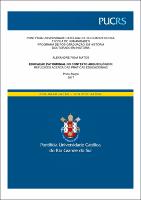| Share record |


|
Please use this identifier to cite or link to this item:
https://tede2.pucrs.br/tede2/handle/tede/7736| Document type: | Tese |
| Title: | Educação patrimonial no contexto arqueológico : reflexões acerca das práticas educacionais |
| Author: | Matos, Alexandre Pena  |
| Advisor: | Hilbert, Klaus Peter Kristian |
| Abstract (native): | Esta tese se propôs a uma reflexão da prática da Educação Patrimonial nas duas vertentes do contexto arqueológico, a arqueologia acadêmica e a preventiva. As questões aqui apresentadas foram suscitadas em meus 10 anos à frente do trabalho arqueológico, principalmente na demanda da divulgação do conhecimento que a pesquisa gera. Há anseios alcançados da difusão do saber, porém ao voltar aos lugares que serviram nos primeiros momentos da propagação do patrimônio cultural, sejam eles locais formais ou informais de ensino, não havia resquício do desenvolvimento do trabalho iniciado, no máximo uma ou outra parcela que considerava os atos de troca de saberes eram para “matar o tempo”, “feriado”, “cumprir uma obrigação”, “um dia festivo” ou “o ato pelo ato”. A reflexão desse processo se fez através de perguntas: como efetuar ações que permaneçam na média e longa duração? Quais são os atores para que este processo se torne possível? Como proceder para que isso aconteça? Sendo assim, empregamos nesse estudo os métodos macroanálise e pesquisa comparativa como abordagem metodológica para refletir sobre as ações educativas na arqueologia acadêmica. As considerações que procuramos aferir foram as potencialidades, as limitações e os desafios que cada grupo observado (professores, alunos, comunidade) usufruiu no contato com o patrimônio cultural por meio das ações para o patrimônio no aspecto educativo e temporal (curto, médio ou de longa duração). |
| Abstract (english): | This thesis proposed a reflection on the practice of Patrimonial Education in the two aspects of the archaeological context, the academic archeology and the preventive. The issues presented here have raised in my 10 years of work at the forefront of archaeological work, mainly in the demand for the dissemination of the knowledge that research generates. There is a longing for the diffusion of knowledge, but when returning to the places that served in the first moments of the propagation of cultural heritage, whether formal or informal places of learning, there was no trace of the development of the work begun, at most one or another part that considered the acts of exchange of knowledge were for "killing time," "holiday," "fulfilling an obligation," "a festive day," or "act for the act’s sake" The reflection of this process was done through questions: how to carry out actions that remain in the average and long duration? What are the actors for this process to become possible? How do you make it happen? Thus, in this study we used the methods macroanalysis and comparative research as a methodological approach to reflect on educational actions in academic archeology. The considerations that we sought to assess were the potentialities, limitations and challenges that each observed group (teachers, students, community) enjoyed in the contact with the cultural patrimony through actions for the educational and temporal heritage (short, medium or long term). |
| Keywords: | Patrimônio Cultural Educação Patrimonial Arqueologia Acadêmica Arqueologia Preventiva |
| CNPQ Knowledge Areas: | CIENCIAS HUMANAS::HISTORIA |
| Language: | por |
| Country: | Brasil |
| Publisher: | Pontifícia Universidade Católica do Rio Grande do Sul |
| Institution Acronym: | PUCRS |
| Department: | Escola de Humanidades |
| Program: | Programa de Pós-Graduação em História |
| Access type: | Acesso Aberto |
| Fulltext access restriction: | Trabalho não apresenta restrição para publicação |
| URI: | http://tede2.pucrs.br/tede2/handle/tede/7736 |
| Issue Date: | 31-Aug-2017 |
| Appears in Collections: | Programa de Pós-Graduação em História |
Files in This Item:
| File | Description | Size | Format | |
|---|---|---|---|---|
| Tese de Alexandre Pena Matos.pdf | ALEXANDRE_PENA_MATOS_TES | 1.39 MB | Adobe PDF |  Download/Open Preview |
Items in DSpace are protected by copyright, with all rights reserved, unless otherwise indicated.




